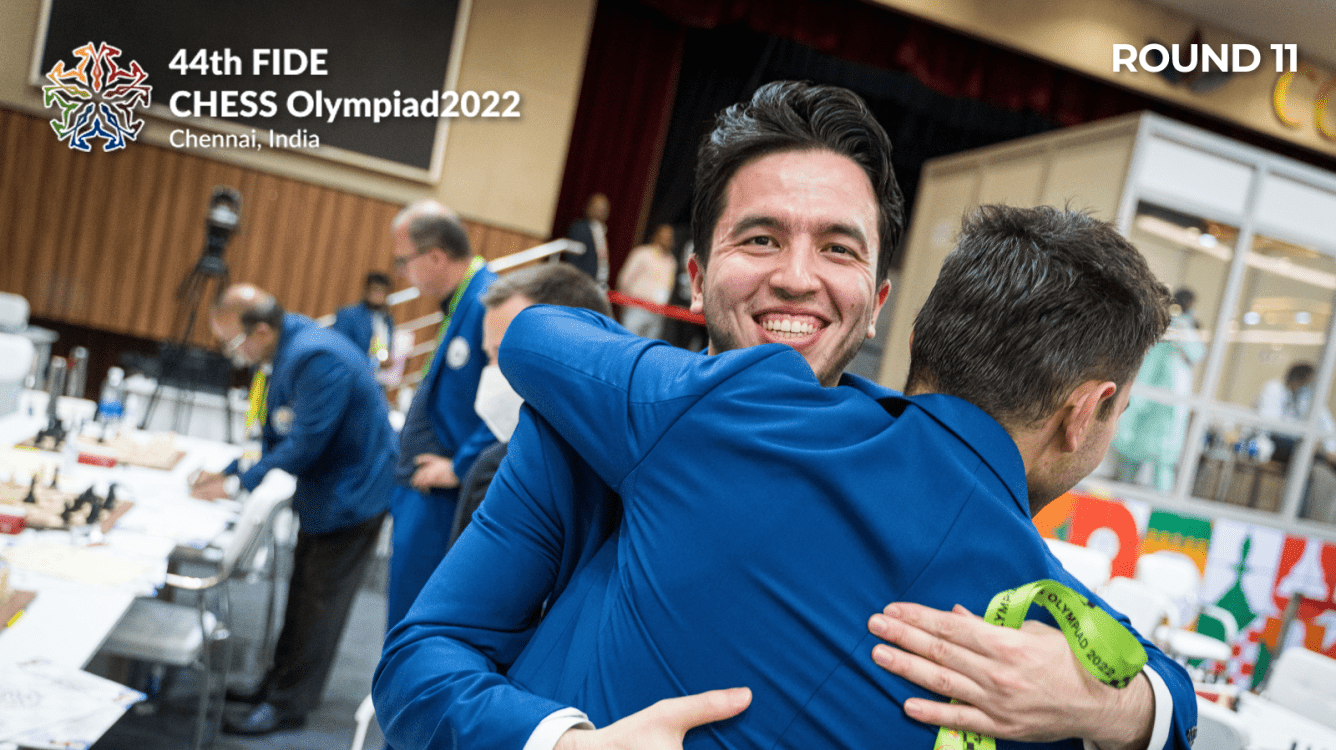
Uzbekistan Wins Gold In Open; Ukraine In Women's; India Wins Gaprindashvili Cup
Continuing with their good form in the event, Uzbekistan and Armenia prevailed over higher seeds Netherland and Spain respectively in the 11th and final round to tie for first-second places with 19 match points in the 44th FIDE Chess Olympiad, with Uzbekistan prevailing on tiebreaks. 11th-seeded India 2 defeated ninth-seeded Germany with an emphatic 3-1 score to win the bronze medal with 18 match points.
The last round of the FIDE Women's Chess Olympiad saw top-seeded and overnight leader India beaten with a 3-1 score by the seventh-seeded U.S. on the top table. In two straight fights between the second point-group countries, Ukraine and Georgia triumphed over Poland and Azerbaijan, respectively. With these results, Ukraine clinched first place while Georgia finished the event in second. India took the bronze medal on tiebreaks after tying with Kazakhstan and U.S. for the third-fifth places.
The Indian first team won the Gaprindashvili Cup by means of finishing fourth in the open and third in the women's, thus with a total rank Sum of seven. U.S. (5+4= rank sum 9) and India 2 (3+8= rank sum 11) finished second and third, respectively.
How to watch the 44th FIDE Chess Olympiad
You can watch the 44th FIDE Chess Olympiad and FIDE Women's Chess Olympiad live on Chess.com/TV and on our Twitch channel, or catch all of our live broadcasts on YouTube.com/ChesscomLive.
You can also keep up with all the details of both events on our live events platform by following the respective links: 44th FIDE Chess Olympiad | 44th FIDE Women's Chess Olympiad.
GM Dommaraju Gukesh of India 2 won the gold medal for the top board prize with a score of 9/11 and a performance rating of 2867. GM Nihal Sarin (India 2, 7.5/10, PR 2774), GM David Howell (England, 7.5/8, PR 2898), GM Jakhongir Vakhidov (Uzbekistan, 6.5/8, PR 2813), and GM Mateusz Bartel (Poland, 8.5/10, PR 2778) were the other gold medal winners for the second-reserve boards.
Legendary GM Pia Cramling of Sweden won the gold medal for the top board prize with a score of 9.5/11 and a performance rating of 2532. GM Nino Batsiashvili (Georgia, 7.5/10, PR 2504), WIM Oliwia Kiolbasa (Poland, 9.5/11, PR 2565), Bat-Erdene Mungunzul (Mongolia, 8.5/10, PR 2460), and WGM Jana Schneider (Germany, 9/10, PR 2414) were the other gold medal winners for the second-reserve boards.
Open Section
When the high-pressure final round started, the most crucial matches were 12th-seeded Armenia (17 match points) vs. fourth-seeded Spain (15) and 14th-seeded Uzbekistan (17) vs. the seventh-seeded Netherlands (15). Though "in-form" teams, Armenia and Uzbekistan were not facing easy opposition; in all but one of the boards—GM Javokhir Sindarov vs. GM Benjamin Bok in Uzbekistan vs. the Netherlands—in both the matches combined, the players of Armenia and Uzbekistan faced higher rated opponents.
Armenia's token to the top in this tournament has been their players' consistency, and it was this main factor that enabled GM Gabriel Sargissian to prevail over GM Alexei Shirov on the top board. But, in a way, it was Shirov's apparent creative urge that resulted in making an impulsive attempt for complications in a crucial position:
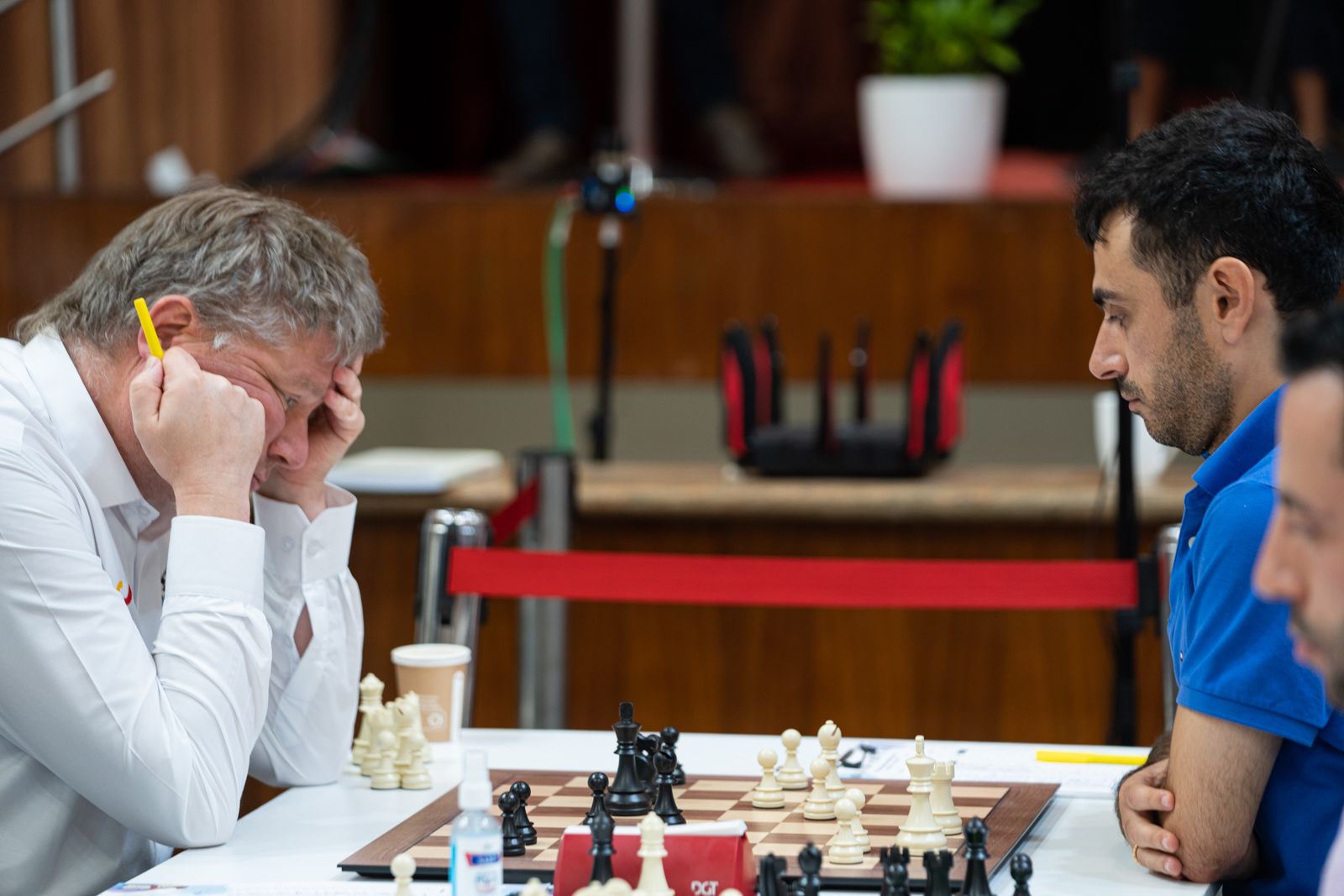
This was the final act of glory by Sargissian, who drew his first four games against decent opposition, lost to Gukesh in the sixth round, and then came back with a 4.5/5 finish, which incredibly included wins against GM Fabiano Caruana, GM Pentala Harikrishna, GM Shakhriyar Mamedyarov, and finally Shirov! Sargissian wresting the advantage early in the game also made life easy for all his teammates as they had to just hold their positions to win the match. A perfect match strategy.

In contrast, the young Uzbekistan's match with the Netherlands had moments of a complete fighting on all the boards at some point:
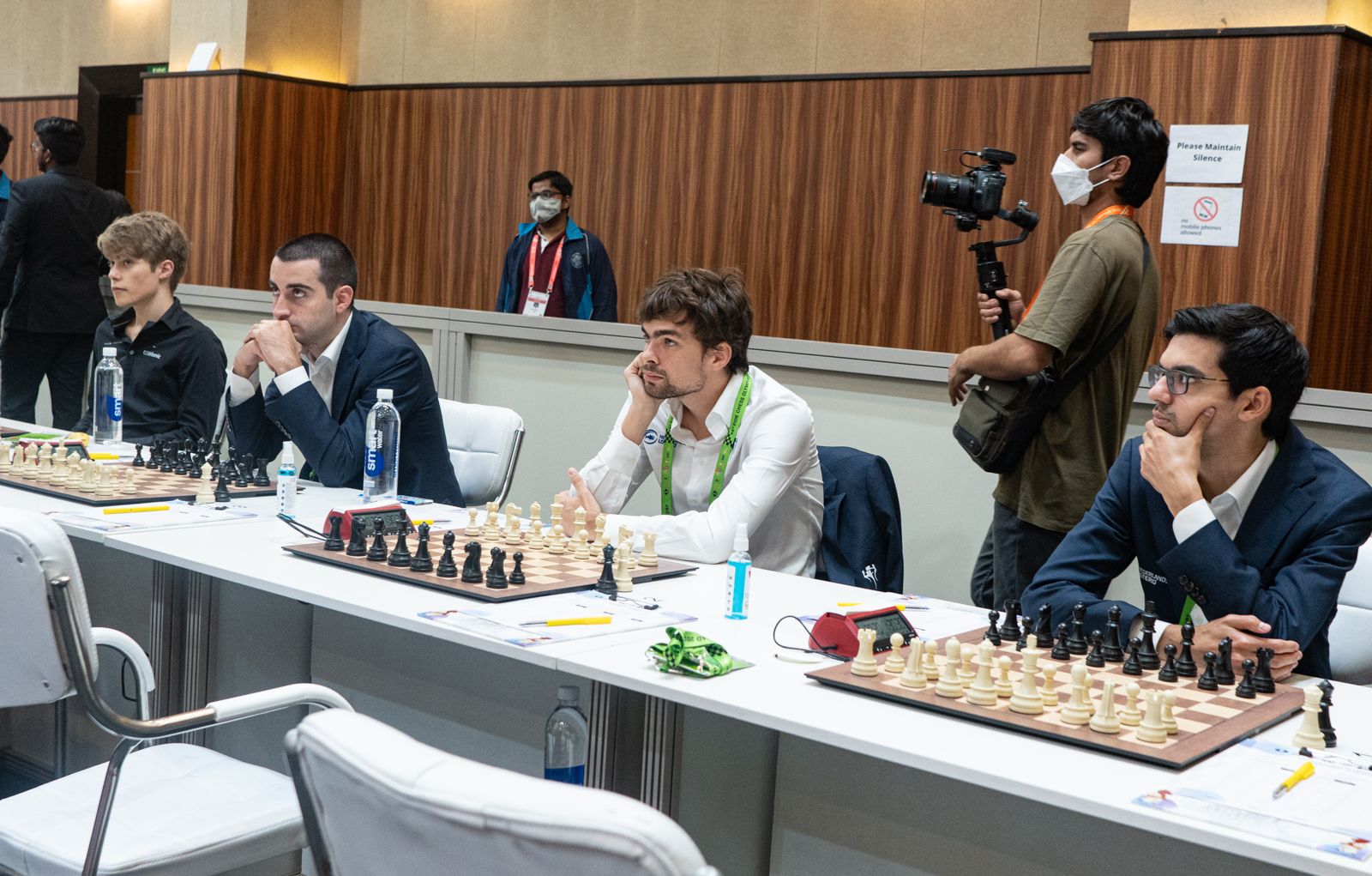
On the Chess.com broadcast, GM Daniel Naroditsky predicted GM Max Warmerdam vs. Vakhidov would be the "pivotal" game for the entire match, and it was indeed this game that gave Uzbekistan the gold medal, which is analyzed as the Game of the Day:
Speaking in the press conference after the end of the match, coach of the team GM Ivan Sokolov remarked, "This is (a) massive result... I am very happy that this great result was achieved with these fantastic young players that have a very bright future ahead of them."
Vakhidov said, "Today ...I played for a win not only for my people but for my board (too). It was too much pressure, ...I tried to focus, because during pressure anything... can happen. When all of the results ...depend on your game, this is too much pressure."
But the best moment of the conference came when GM Nodirbek Yakubboev was asked if he was aware of his second board individual medal chances before his game against GM Jordan van Foreest and he replied firmly, "...Team medal is more important than individual".

There was an intense fight in the other two matches of the day too, and the young India 2 once again scalped the higher-seeded Germany with a 3-1 score. Nihal's win over GM Matthias Bluebaum was termed by Naroditsky as a "resounding positional masterpiece":
GM Raunak Sadhwani and GM Dieter Nisipeanu decided to play a marvelously complicated game true to their styles:
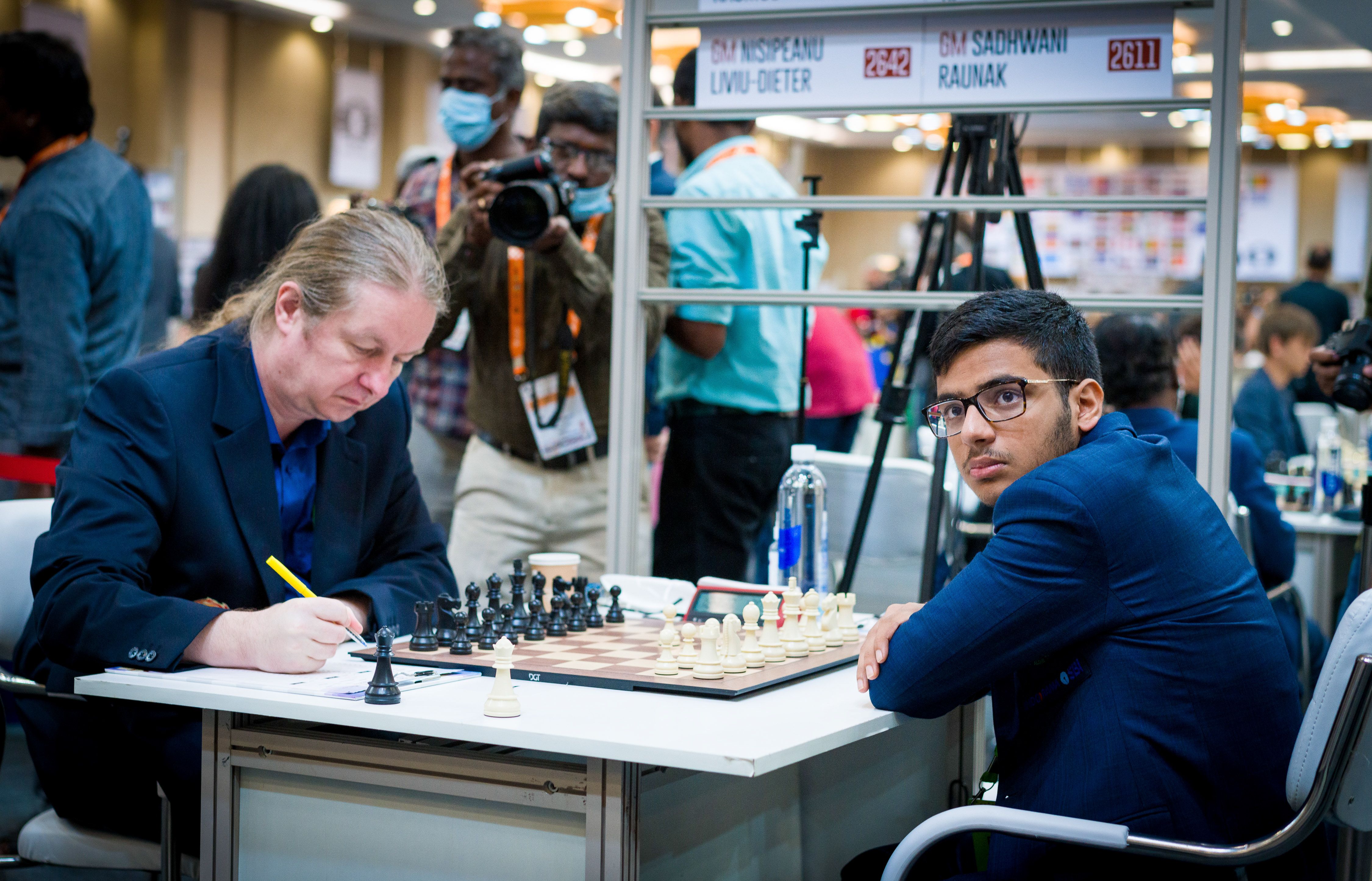
It was ironic that the top two seeds of the tournament, the U.S. and India, had to play each other in the final round when they both had an outside chance of a medal, but they had a full-fledged fight too. But it all ended in parity, as befitted an even matchup.
GM Arjun Erigaisi impressed with a well-conducted positional game against the formidable GM Leinier Domniguez:
GM Sam Shankland was impressive in a well-conducted endgame:
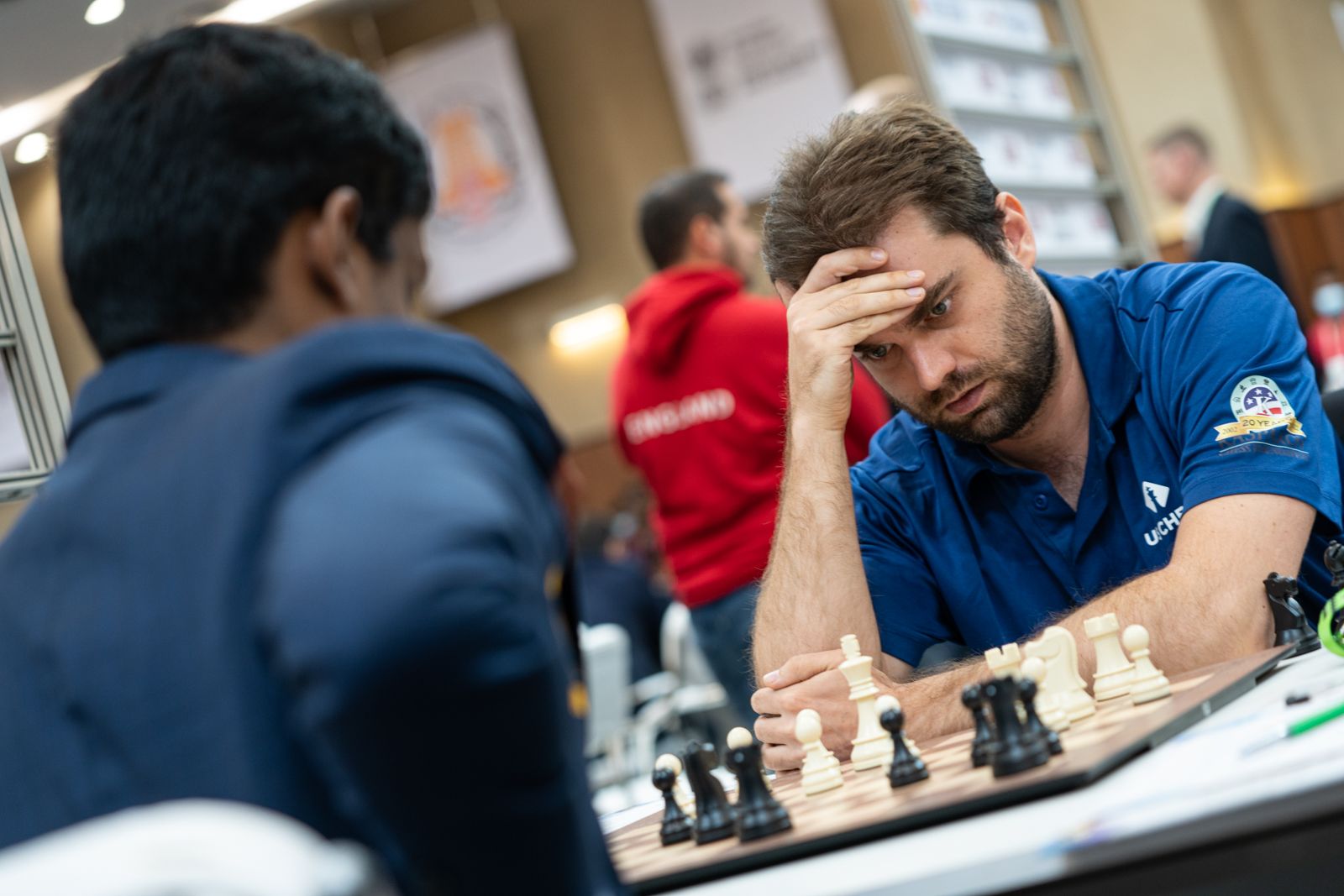
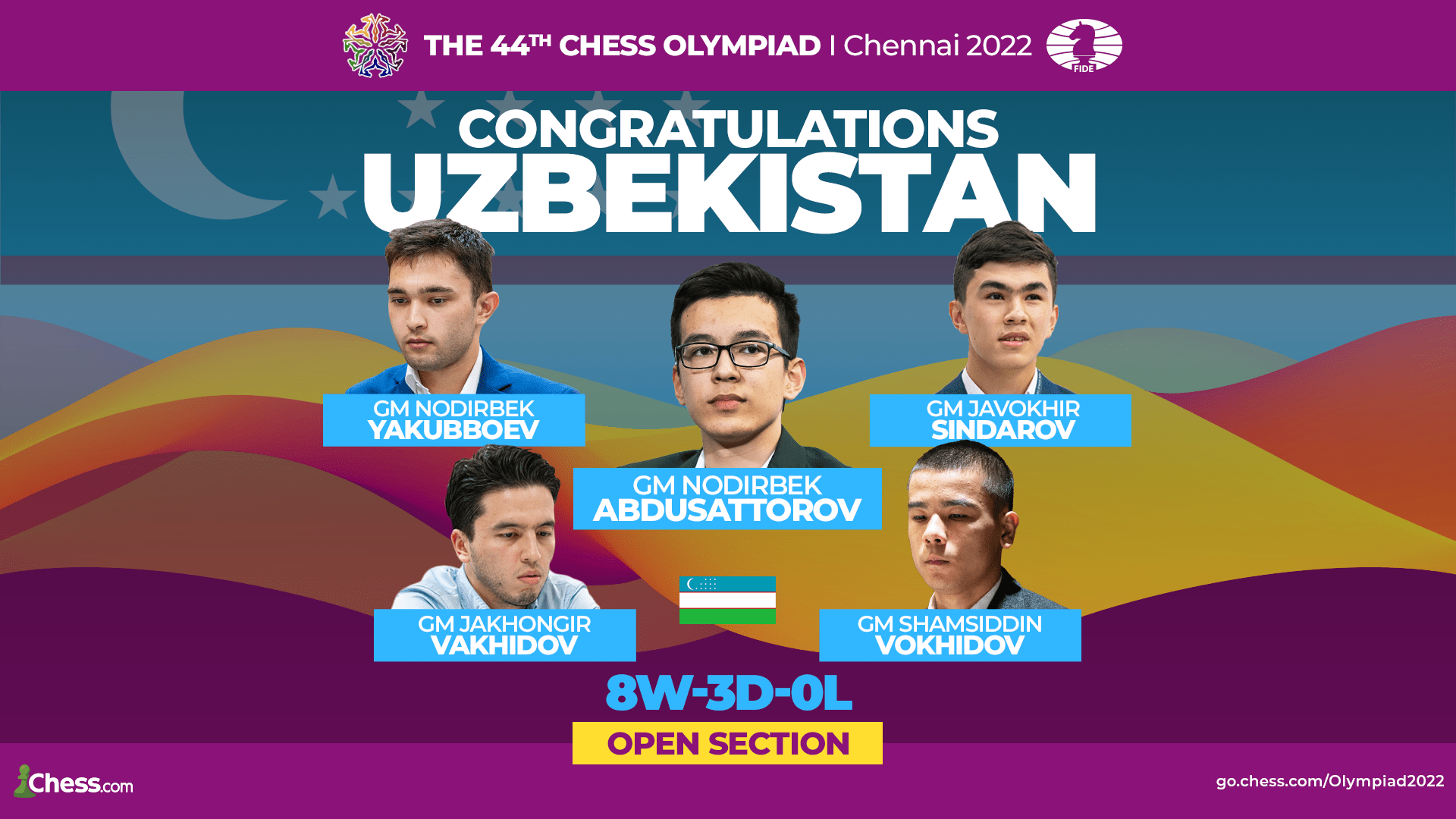

See full results here.
Women's Section
Comparatively, the women's section saw many games where the tense tournament situation caused lots of uneven play and obvious mistakes by the players. Tournament leaders and the top-seeded teams had a bad day at the office, as none of the games went their way almost from the very beginning. While GM Humpy Koneru survived anxious moments in the middlegame, IM Tania Sachdev was beaten in a complicated struggle by IM Carissa Yip from the black side of a complicated King's Indian Defense. Though the game wasn't flawless, the competitive pressure of the last round probably got on to Sachdev:
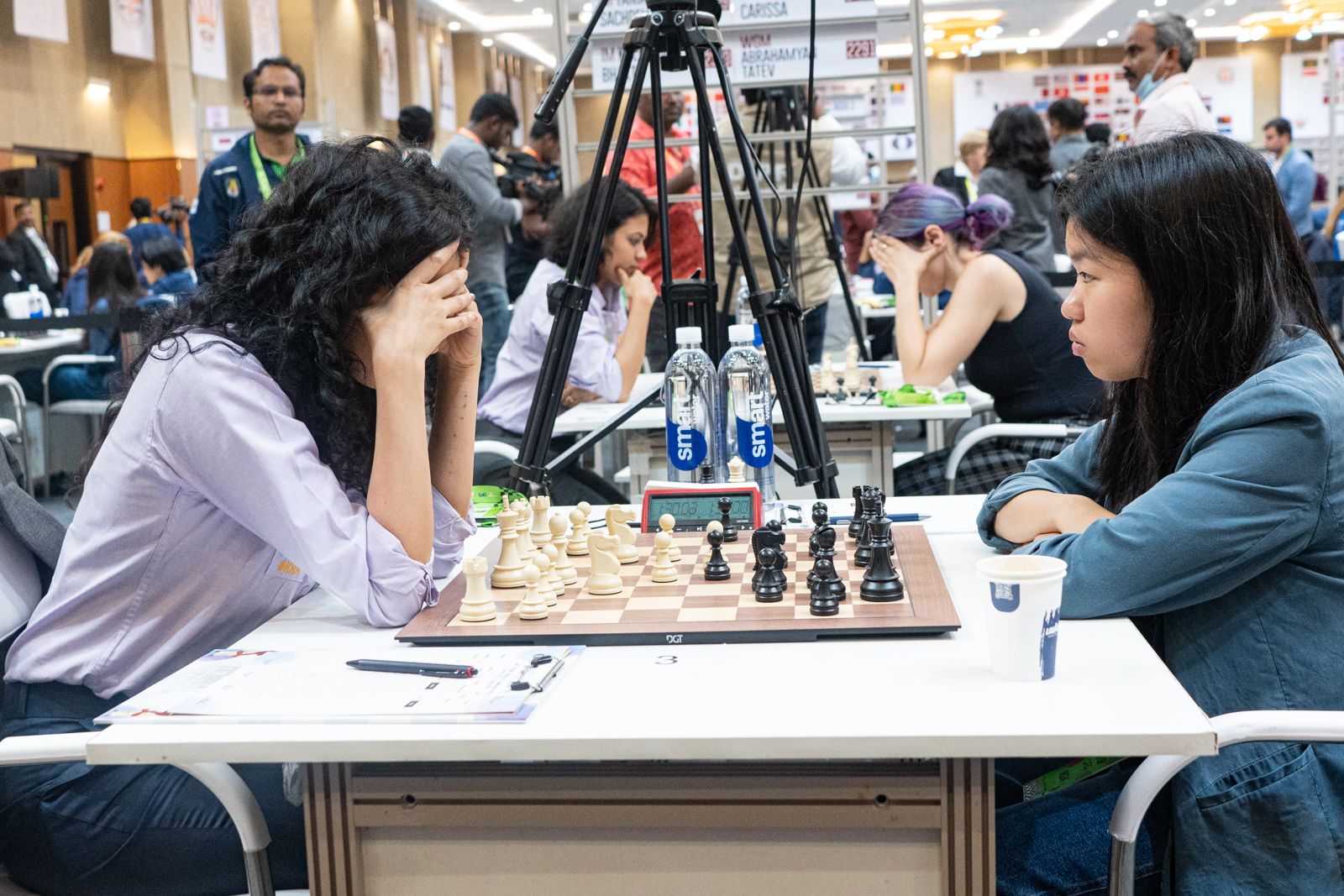
On the fourth board, too, WGM Tatev Abrahamyan caught IM Bhakti Kulkarni in early difficulties and played a near-flawless game to score a creditable win:
With India thus caught in early difficulties since the beginning of the round, it invigorated Ukraine and Georgia to give their best on the board. For Ukraine, GM Mariya Muzychuk benefitted from a "fingerfehler":
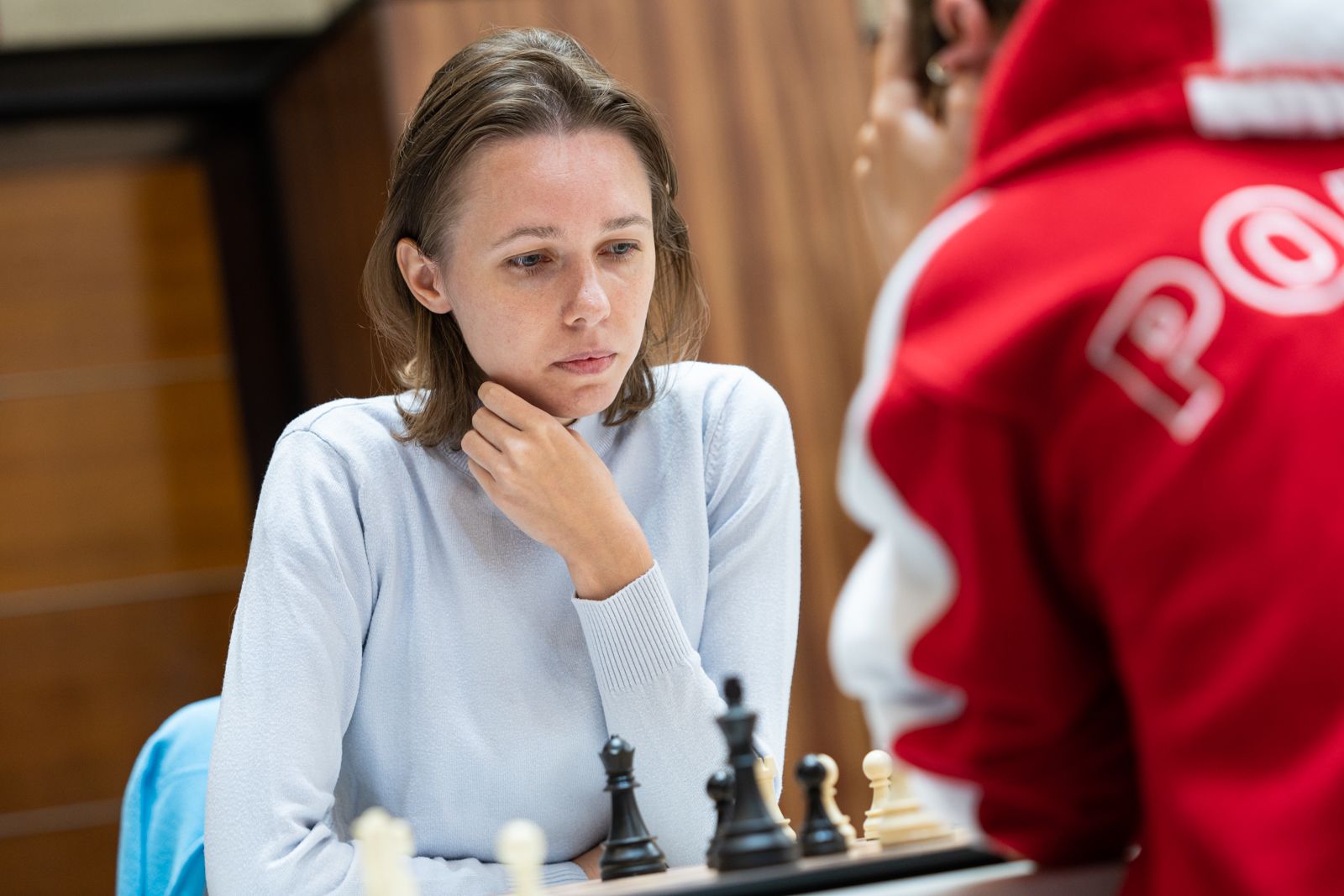
GM Anna Ushenina won a pawn in the middlegame against in-form WIM Oliwia Kiolbasa and again benefitted from inaccurate play in an equal rook ending:
The other important fight between Azerbaijan and Georgia also saw many uneven moments:
The best game of the match was played by IM Meri Arabidze:
Thus, Ukraine and Georgia both won their matches and overtook the leader India. Ukraine was declared the winner on tiebreaks. Both GM Arturs Neiksans and Naroditsky were generous in their praise for Ukraine's effort. "Well deserved by team Ukraine, given the fact what is happening [in] their country. I mean, how do you even concentrate on chess right now?" said Neiksans, while Naroditsky joined him with, "All of them still have ... their [families] in Ukraine. What a heartwarming story!"
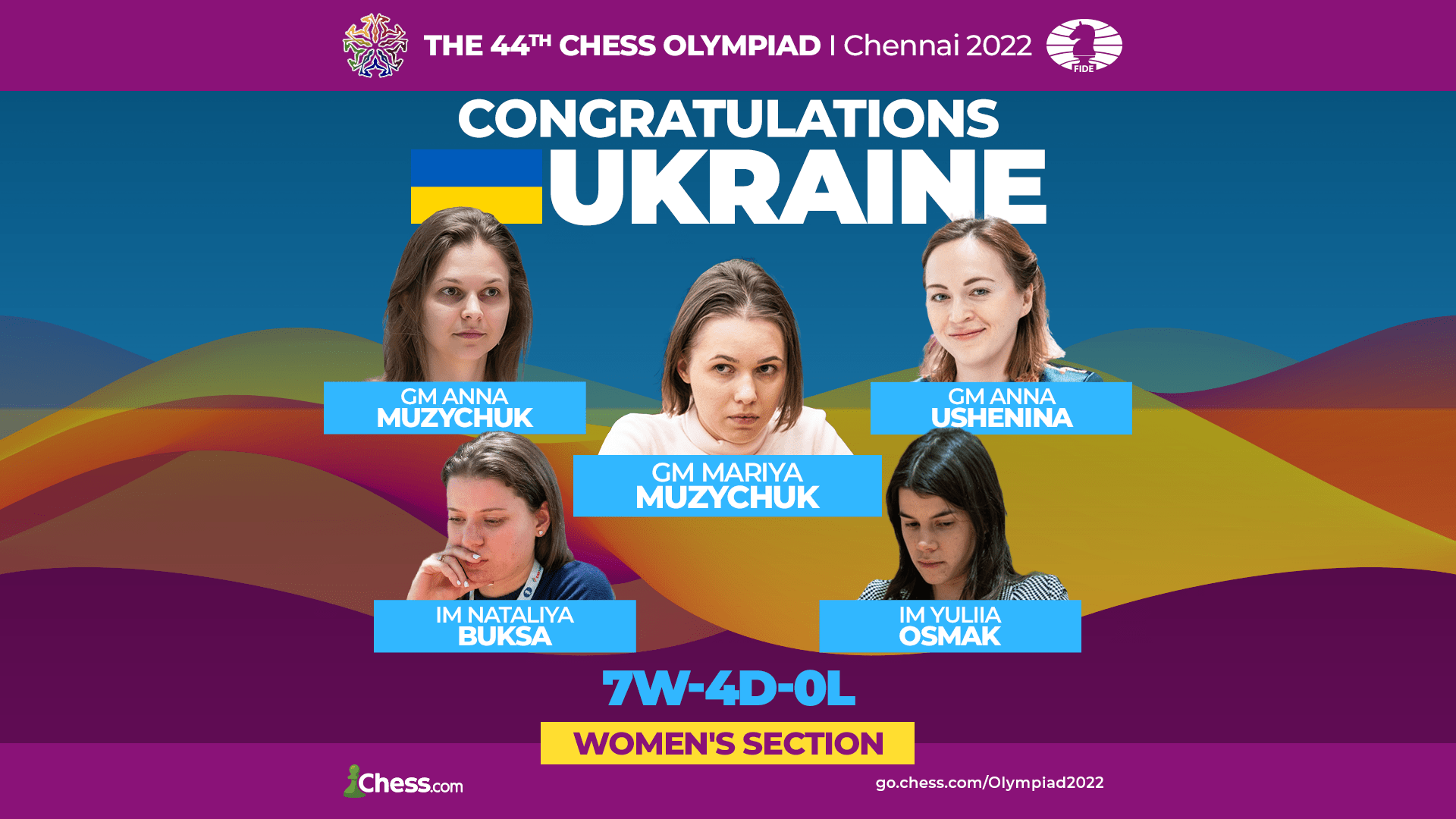
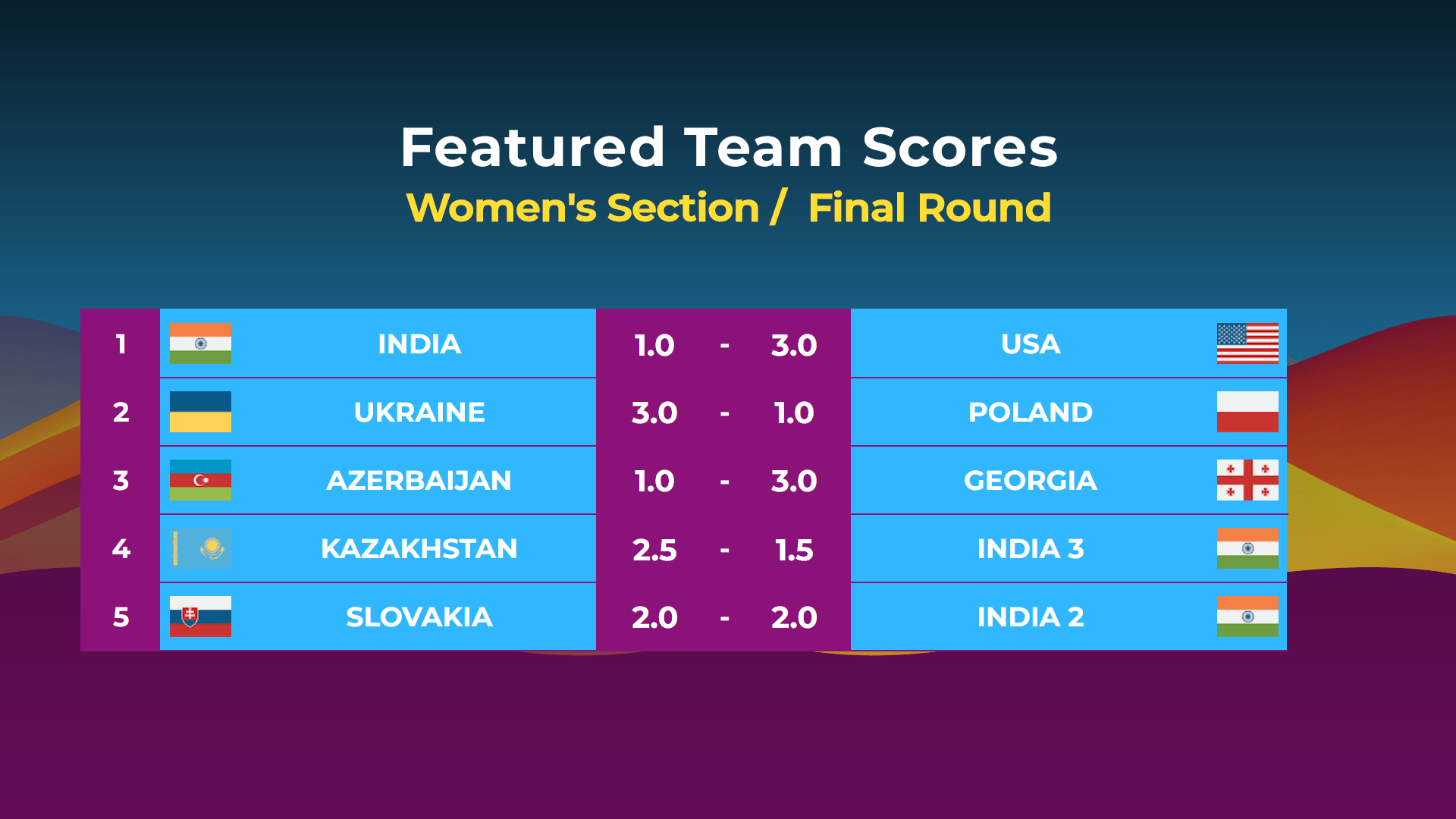
See full results here.
The 44th FIDE Chess Olympiad and Women's Chess Olympiad are over-the-board team events where national chess federations compete in classical games for gold medals, trophies, and the title of strongest chess nation in the world. The event consists of an 11-round Swiss tournament where each player from a national team plays against another player from the opposing national team. Teams receive "game points" for winning or drawing games and "match points" for winning or drawing a match. Teams with the most match points for each section become the champions of their section, with a third award going for the team with the most points from both sections combined.
Previous Coverage:
- Armenia, Uzbekistan Share Lead In Open; India Leads In Women's
- Uzbekistan Jumps To Lead In Open; Four Share Lead In Women's; Kiolbasa Advances To 9/9
- Armenia In Open, India In Women's Maintain Lead; Gukesh Defeats Caruana To Score 8/8
- Armenia Retains Lead In Open; India Widens Lead In Women's; Gukesh 7/7
- Armenia Sole Leader In Open, India In Women's, Gukesh 6/6 On Top Board
- India 2, Armenia Lead Open; India, Georgia, Romania Lead Women's
- Held By Uzbekistan, U.S. Survives Scare; Abdusattorov Shocks Caruana
- Italy Shocks Norway On Day Of Endgames, Estonian Grandmaster Faints At Board
- Favorites Continue With All Wins
- Nearly Smooth Sailing For Top Seeds In Day Of Zugzwangs
- 44th FIDE Chess Olympiad Inaugurated In Chennai, India
- 44th FIDE Chess Olympiad: All The Information
- 44th FIDE Women's Chess Olympiad: All The Information


